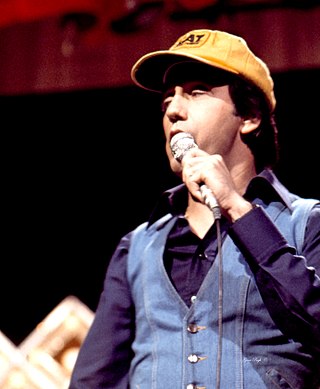
Harold Ray Ragsdale, known professionally as Ray Stevens, is an American country and pop singer-songwriter and comedian, known for his Grammy-winning recordings "Everything Is Beautiful" and "Misty", as well as novelty hits such as "Gitarzan" and "The Streak". Stevens has received gold albums for his music sales and has worked as a producer, music arranger, and television host. He is also an inductee of the Nashville Songwriters Hall of Fame, the Georgia Music Hall of Fame, the Christian Music Hall of Fame, and the Country Music Hall of Fame and Museum.

1,837 Seconds of Humor is the debut album of Ray Stevens, released in 1962. The front of the album shows a sheik that rides a camel, which is a reference to Stevens' song "Ahab the Arab." All of the material on the album was written by Ray Stevens and published by Lowery Music Co., Inc. (BMI). The back of the album cover contains an essay of biographical information of Stevens from his youth in his hometown of Clarkdale, Georgia to the time of this album's release and gives brief descriptions of all the songs on the album. Four singles were lifted from the album: "Jeremiah Peabody's Poly Unsaturated Quick Dissolving Fast Acting Pleasant Tasting Green and Purple Pills", "Scratch My Back ", "Ahab the Arab", and "Further More."
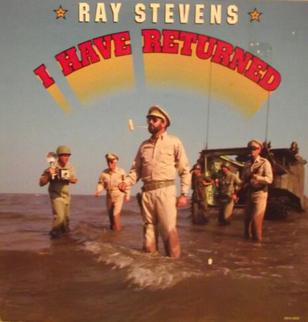
I Have Returned was Ray Stevens' twenty-second studio album and his second for MCA Records, released in 1985. The pictures on both the front and the back of the album were taken in the Mississippi Sound near Biloxi, Mississippi according to the album credits. The cover depicts Stevens dressed as General Douglas MacArthur from World War II. "The Haircut Song" and "The Ballad of the Blue Cyclone" were released as singles from the album. "Santa Claus Is Watching You" is a re-recording of Stevens' 1960s pop single and was re-issued as a country single around the time of the album's release and was made into a popular music video.
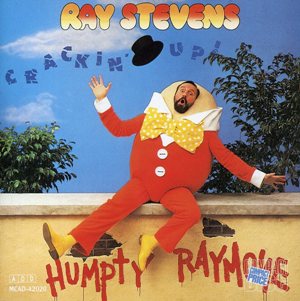
Crackin' Up! was Ray Stevens' twenty-fourth studio album and his fourth for MCA Records, released in 1987. Three singles were lifted from the album: "Would Jesus Wear a Rolex", "Three-Legged Man" and "Sex Symbols", the last two of which did not chart.

Barry Manilow is an American singer and songwriter with a career that spans seven decades. His hit recordings include "Could It Be Magic", "Looks Like We Made It", "Mandy", "I Write the Songs", "Can't Smile Without You", "Weekend in New England" and "Copacabana ".
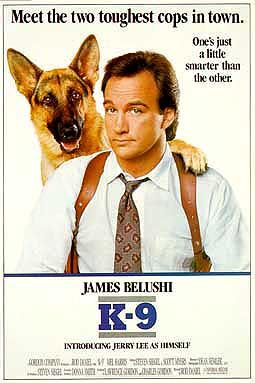
K-9 is a 1989 American buddy cop action comedy film starring Jim Belushi and Mel Harris. It was directed by Rod Daniel, written by Steven Siegel and Scott Myers, produced by Lawrence Gordon and Charles Gordon, and released by Universal Pictures.

"Ahab the Arab" is a novelty song written and recorded by Ray Stevens in 1962.
"Jeremiah Peabody's Polyunsaturated Quick-Dissolving Fast-Acting Pleasant-Tasting Green and Purple Pills" is a novelty song that was written and performed by Ray Stevens. It was released as a single in 1961 and became Stevens' very first Hot 100 single, peaking at #35 in September. Its lyrics tell of a fictional "wonder drug" that, when taken in a daily dose, can cure myriad ailments, much in the same way unscrupulous patent medicine salesmen marketed their wares in the 19th and early 20th centuries.
James Layng Martine Jr. is an American songwriter whose compositions have appeared on the country and pop music charts over a four-decade span beginning in the late 1960s. His songs, "Way Down" and "Rub it In", have each been recorded by over 20 artists. In 2013, he was inducted into the Nashville Songwriters Hall of Fame. Some of Martine's writing credits include Elvis Presley's million-selling "Way Down"; The Pointer Sisters' Top Ten "Should I Do It" and Trisha Yearwood's "I Wanna Go Too Far".
Oscar Brashear was an American jazz trumpeter and session musician from Chicago, Illinois.

His Best is a greatest hits album by American blues musician Howlin' Wolf. The album was originally released on April 8, 1997, by MCA/Chess Records, and was one of a series of releases by MCA for the 50th anniversary of Chess Records that year. Ten years later – on April 17, 2007 – the album was reissued by Geffen Records as The Definitive Collection.
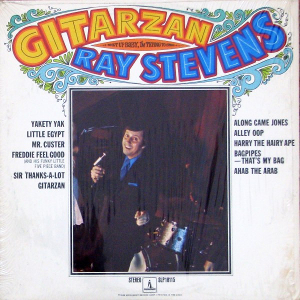
Gitarzan was Ray Stevens' fourth studio album, released in 1969, as well as his second for Monument Records. Unlike his previous album, Even Stevens, this album is completely in the genres of novelty and comedy. Although this is a true studio album, all of the songs are overdubbed with cheering and applauding of an audience to provide the feeling of a live album. Contents include three of the Coasters' hits, "Mr. Custer," and "Alley Oop." The album also contains re-recordings of his two novelty hits, "Harry the Hairy Ape" and "Ahab the Arab." "Freddie Feelgood " makes its first appearance on an album but is overdubbed with audience noises for this album.
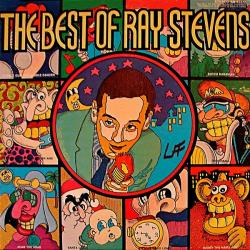
The Best of Ray Stevens is a collection of previously recorded songs by Ray Stevens. The sixth track, "Santa Claus Is Watching You," was electronically re-recorded to simulate stereo.

Boogity Boogity was Ray Stevens' eleventh studio album, released in 1974, as well as his sixth for Barnaby Records. For this album, Stevens returns to the genres of novelty and comedy. The album was released to capitalize on the success of his hit single "The Streak", which was inspired by the fad of streaking during that time period. Stevens' two songs, "Freddie Feelgood " and "Bagpipes That's My Bag," were taken from his album Gitarzan and were reissued on this album. The front of the album cover shows Stevens running in a blur, seemingly in the nude, and also contains the phrases "Woosh!!" and "Don't look Ethel!" the latter of which is part of the lyrics to the primary single of the album.

The Very Best of Ray Stevens is a collection of 12 previously released singles that were hits for novelty/country artist, Ray Stevens; it was released in December 1975 by Barnaby Records. While this collection has more emphasis on Stevens' hits for Barnaby, it also contains three from the label of Monument Records and two from Mercury Records. The version of "Mr. Businessman" is the single release. "Gitarzan" is the album version that begins with an audience cheering and applauding. "Ahab the Arab" is the original recording that was released by Mercury.
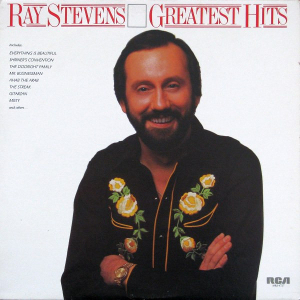
Greatest Hits is a collection of ten previously released singles by Ray Stevens, released in 1983 by RCA Records. This collection contains three singles that were released by Monument Records, four by Barnaby Records, and two by RCA. One of the selections is not an original recording; "Ahab the Arab" is a re-recording of Stevens' 1962 hit for Mercury Records that was included on his album Gitarzan, which was released by Monument in 1969. Additionally, there are two selections featured on this collection that are album versions; "Gitarzan" is the album version that begins with cheering and applauding with an audience; "Freddie Feelgood" is the version that contains audience noises and was first featured on the album Gitarzan.

All-Time Greatest Hits is a collection of 23 songs that were previously recorded by Ray Stevens, released in 2001. Like many collections of Stevens' music, it concentrates 99% on recordings that were made for the record labels of Monument and Barnaby. The one exception is the first track, "Sergeant Preston of the Yukon," an unsuccessful hit that was released in 1960 by the NRC label. "Sergeant Preston of the Yukon" makes its first album appearance on this collection. The rest of the selections were recorded between the years of 1966 to 1975.

Greatest Hits, Vol. 1 is a collection of ten previously released singles by Ray Stevens, released in 1987. Of the selections of songs, three were recorded for the record label of Monument Records, four for Barnaby Records, one for RCA Records, and two for MCA Records. The version of "Gitarzan" is the album version that begins with cheering and applauding of an audience. The version of "Ahab the Arab" on this compilation is not the original recording but a re-recording that Stevens made for his album Gitarzan during his career with Monument.

I Never Made a Record I Didn't Like is Ray Stevens' twenty-fifth studio album and his fifth for MCA Records, released in 1988. Two singles were lifted from the album: "Surfin' U.S.S.R." and "The Day I Tried to Teach Charlene Mackenzie How to Drive." The "Surfin' U.S.S.R." single was accompanied with a music video. The song blends the sound of the Beach Boys with the real world events of the Soviet Union. The second single tells the story of how Stevens attempts to teach a deaf woman how to drive. The character would play an important role several years later when Stevens filmed his direct-to-home video movie, Get Serious!. Connie Freeman portrayed Charlene Mackenzie in the movie.
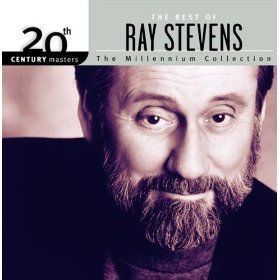
20th Century Masters – The Millennium Collection: The Best of Ray Stevens is a 12-track collection of previously recorded songs by Ray Stevens, released in 2004. It consists of the biggest hits he had from 1961 to 1987, starting with his breakthrough hit "Jeremiah Peabody's Polyunsaturated Quick-Dissolving Fast-Acting Pleasant-Tasting Green and Purple Pills" to his hit "Would Jesus Wear a Rolex". Unlike many compilations of Stevens' music, this collection contains the original recordings of "Ahab the Arab" and "Harry the Hairy Ape", which were re-recorded for Stevens' fourth studio album Gitarzan. The selections of "Freddie Feelgood", "Mr. Businessman" and "Gitarzan" are album versions, the first and third of which were featured on Gitarzan. Inside the album cover are information on the featured singles and a biographical essay written by Gene Sculatti back in December 2003. In the essay, Sculatti mistakenly says that Gitarzan is the one who shouts, "Shut up, baby! I'm tryin' to sing!" in the song "Gitarzan", as it is actually Jane who shouts this phrase.
















